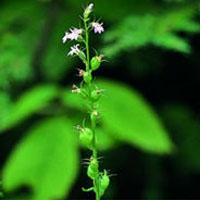Lobelia
 © Martin Wall
© Martin WallParts Used & Where Grown
Lobelia grows throughout North America. The leaves are primarily used in herbal medicine.
- Reliable and relatively consistent scientific data showing a substantial health benefit.
- Contradictory, insufficient, or preliminary studies suggesting a health benefit or minimal health benefit.
- For an herb, supported by traditional use but minimal or no scientific evidence. For a supplement, little scientific support.
Our proprietary “Star-Rating” system was developed to help you easily understand the amount of scientific support behind each supplement in relation to a specific health condition. While there is no way to predict whether a vitamin, mineral, or herb will successfully treat or prevent associated health conditions, our unique ratings tell you how well these supplements are understood by the medical community, and whether studies have found them to be effective for other people.
For over a decade, our team has combed through thousands of research articles published in reputable journals. To help you make educated decisions, and to better understand controversial or confusing supplements, our medical experts have digested the science into these three easy-to-follow ratings. We hope this provides you with a helpful resource to make informed decisions towards your health and well-being.
This supplement has been used in connection with the following health conditions:
| Used for | Amount | Why |
|---|---|---|
Asthma | Refer to label instructions | Lobelia has been used traditionally to treat coughs and spasms in the lungs from all kinds of causes. |
Bronchitis | Refer to label instructions | Very small amounts of this herb are considered helpful in suppressing or easing coughs. The herb has also shown anti-inflammatory properties. |
Chronic Obstructive Pulmonary Disease | Refer to label instructions | Lobelia is used traditionally to promote mucus discharge. |
Cough | Refer to label instructions | Lobelia has a long history of use for relieving coughs. |
Smoking Cessation | Refer to label instructions | Research suggest that lobelia herb, which contains a substance with a similar effect on the nervous system as nicotine, could be useful in supporting smoking cessation. |
Traditional Use (May Not Be Supported by Scientific Studies)
Eclectic physicians, early North American doctors who used herbs as their primary medicine, considered lobelia to be one of the most important medicinal plants.1 It was used by Eclectics to treat coughs and spasms in the lungs from varying causes, as well as spasms elsewhere in the body, including the intestines and ureters (passages from the kidney to the bladder).2 Lobelia was also considered a useful pain reliever and in higher amounts was used to induce vomiting in people who had been poisoned.
Copyright © 2026 TraceGains, Inc. All rights reserved.
Learn more about TraceGains, the company.
The information presented by TraceGains is for informational purposes only. It is based on scientific studies (human, animal, or in vitro), clinical experience, or traditional usage as cited in each article. The results reported may not necessarily occur in all individuals. Self-treatment is not recommended for life-threatening conditions that require medical treatment under a doctor's care. For many of the conditions discussed, treatment with prescription or over the counter medication is also available. Consult your doctor, practitioner, and/or pharmacist for any health problem and before using any supplements or before making any changes in prescribed medications. Information expires December 2026.
